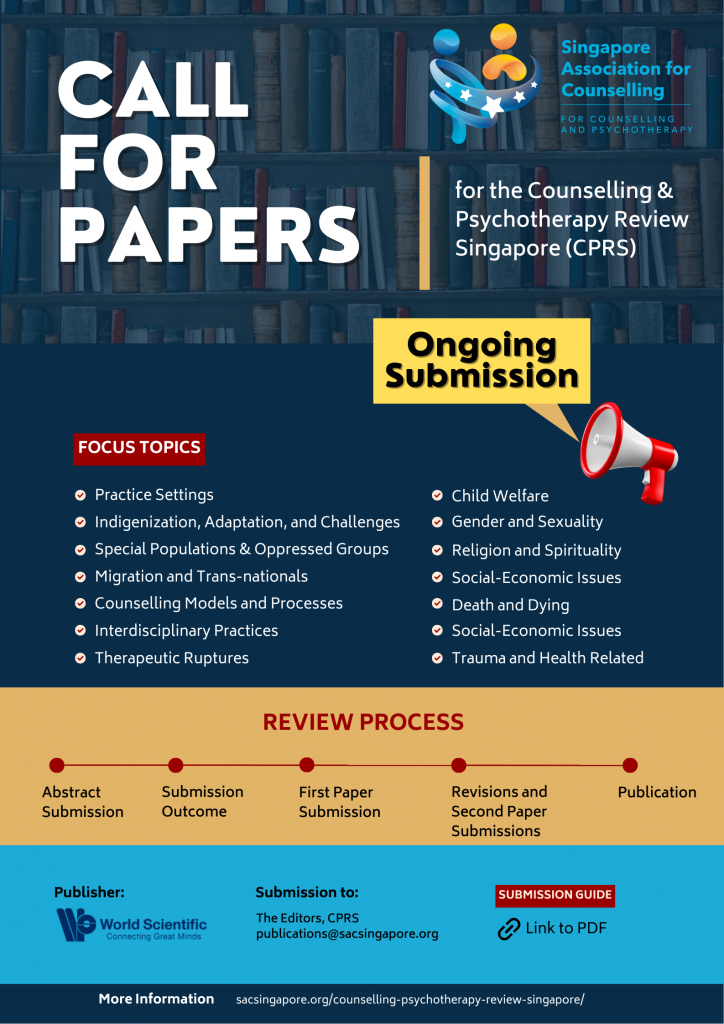Announcement:Explore new perspectives with CPRS Volume 2
|
A) Aims and Scope
The Counselling & Psychotherapy Review Singapore is a platform for practitioners, researchers, and educators to come together to share and learn best counselling and client-focused practices that have practical implications and relevance for effectively helping clients. The emphasis of the annal is on advancing professional knowledge and skills that can positively contribute to clients’ growth, development, and well-being. Readers can expect to gain new insights on the diverse counselling approaches, interventions and strategies that may be applied to enhance the overall quality of care to clients in a larger community.
The annal aims to explore and document best practices of counselling that have been developed as alternative ways to challenge local practice problems, societal issues and setting-related difficulties.
The annal focuses on three areas: 1) Practice-based research, 2) Indigenous or adaptation of counselling modalities relevant to local contexts, and 3) Issues concerning special settings or clientele populations in Singapore and other Asian societies.
B) Guidelines for Contributors
Research and publication ethics
Research Approval:
All manuscripts dealing with human subjects must include a statement that informed consent has been sought and that the study has been approved by an institutional review board.
Policy on Duplicate Publication:
Submitted manuscripts must not have been previously published or be under consideration for publication elsewhere.
Recommended Topics
- Religion and Spirituality
- Ethnicity
- Gender and Sexuality
- Lifespan Development
- Social-Economic Issues
- Death and Dying
- Correctional Rehabilitation
- Addiction
- Child Welfare
- Trauma-related
- Health-related
- Special Populations & Oppressed groups
- Migration and Trans-national individuals/families
- Counselling Models and Processes
- Indigenization, Adaptation, and Challenges
- Therapeutic Ruptures
- Interdisciplinary Practices
- Practice Settings
- Ethical Issues
Manuscript Guidelines
All manuscripts must be typewritten in font size 12 and double-spaced. The presentation style must follow the Publication Manual of the American Psychological Association (7th edition). British or American spellings are acceptable but must be consistent throughout the manuscript.
If applicable, the following statements must be included in a separate section (entitled “Compliance with Ethical Standards”) in the manuscript:
- Disclosure of potential conflicts of interest
- Approval by Institutional Review Board (name of institution and reference number)
Structure and word limits:
- A title page providing authors’ names, institutional affiliations and contacts (email and phone number).
- Abstract: 150-200 words plus 5 key words
- Text (inclusive of footnotes and references):
- Review Articles: 4000-5000 words.
- Original empirical quantitative articles: 3000-6000 words.
- Original empirical qualitative articles: 3000-7000 words.
- Original clinical case studies: 3000-4000 words.
- Tables and figures: 5 in total. Authors are responsible for obtaining copyright permission for reproducing tables, figures, photographs or illustrations from published materials.
C) Submission of Manuscript
All manuscripts are to be submitted via email to:
The Editors, Counselling & Psychotherapy Review Singapore
Email: publications@sacsingapore.org
Authors are required to ensure that their manuscripts meet the journal requirements as described above prior to submission. If they do not meet the journal requirements, the manuscript will be returned to the authors prior to peer review.
D) Peer Review
The Counselling & Psychotherapy Review Singapore follows a rigorous double-blind reviewing policy in which the identities of the author and reviewer are not disclosed to each other. The editors will initially review each manuscript. Only those manuscripts that meet the scientific standards, aims and scope of the journal will be sent for further review. Each manuscript is reviewed by at least two expert referees. The editors are responsible for final decisions regarding the acceptance of a peer-reviewed paper.

